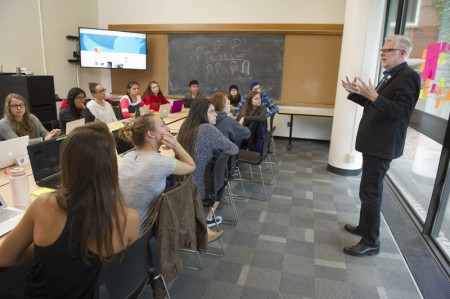 For the first semester in a while, Mike Ridley is not teaching a course in U of G’s first-year seminar (FYS) program.
For the first semester in a while, Mike Ridley is not teaching a course in U of G’s first-year seminar (FYS) program.
The former chief librarian and chief information officer has delivered several perennial favourites to first-year students at U of G, including courses called “Twitter: #Profound or #Pretentious,” “Beyond Literacy” and “The #Stationary Crew.”
Has Ridley lost interest? Hardly.
This year, while longtime director and history professor Jacqueline Murray pursues a research leave, he’s doing what he can to promote first-year seminars as acting director of the program.
Available to incoming students at the University of Guelph, each seminar course accommodates only 18 students. The small size allows students to work more closely with classmates and the instructor than most first-year offerings, says Ridley.
In a story published earlier this year in U of G’s Portico magazine, student Valesca de Groot says the seminar course “Reading Stories, Reading the World” offered her closer engagement with other students and with their instructor.
“The small class stimulated more communication,” says de Groot. “We talked about current issues in a way that’s not possible with 500 people. You can connect more with the teacher.”

For both students and instructors, first-year seminars are a place for experimenting with less conventional learning methods. For example, instructors have assigned students to produce a radio documentary, devise a project with a community group and explain science to street youth.
Instructors can also use the program to broaden their teaching portfolio, and to pursue interests and passions beyond their academic specialty, which can help invigorate instructors and boost morale, says Ridley.
The FYS program was launched in 2004, with courses taught by faculty, senior administrators and professional staff. The program ran for five years before a two-year hiatus; new funding restored the program in 2011.
This semester, 23 seminar courses are available, and 17 are lined up for winter. All seminars are open to any first-year student.
“It’s not a science focus, not an art focus, not a social science focus: it’s a program that cuts across all those disciplines,” he says of the FYS program.
This year, Ridley hopes to attract more instructors to top up the program and add even more courses. He’s also looking for ways to advertise first-year seminars more broadly among incoming students, including using social media and video to convey the flavour of the classes to prospects.
Courses often connect to larger societal issues: “Thinking Outside the Bottle” addresses the lack of safe drinking water in some indigenous Canadian communities; “Animal Stories” looks at the human-animal bond.
Economics professor Louise Grogan is pairing up two popular economic history books in an offering called “Guns, Germs and Steel, and The Great Escape.”
In geography professor Evan Fraser’s course — “Feeding 9 Billion Ideas Congress” — first-year students team up with senior undergrads to develop ideas for improving the planet’s food security.
Other course topics are more idiosyncratic.
This semester, history professor Kevin James is teaching “The Extraordinary History of Stuff,” while Prof. Brent McKenzie, Marketing and Consumer Studies, is teaching “Dark Tourism.”
A repeat seminar this semester is “Baseball by the Numbers,” a course given by psychology professor Ian Newby-Clark.
“It’s really a course about statistics,” says Ridley. “He puts it in the context of baseball, and suddenly statistics means something different for students.”
Which one would Ridley take this semester if he had the chance? “Sleep: 1/3 of Your Life Spent With Your Eyes Closed” is another repeat seminar taught by first-year biology course coordinator Justine Tishinsky.
“We think we know lots about sleep, but we don’t think about sleep,” says Ridley. “It’s not just restorative. It helps with memory and learning.”
So do first-year seminars themselves, he says.
Recent studies led by Murray show FYS students develop skills especially in critical thinking and collaborative learning that carry over to other courses. Those students also commit more time and effort to these courses, and expand their research into a wider range of resources than students not enrolled in a seminar.
Ridley is now talking with with U of G’s Open Learning and Educational Support about teaching approaches and ideas.
“Teaching a first-year seminar in this program is just too much fun.”
